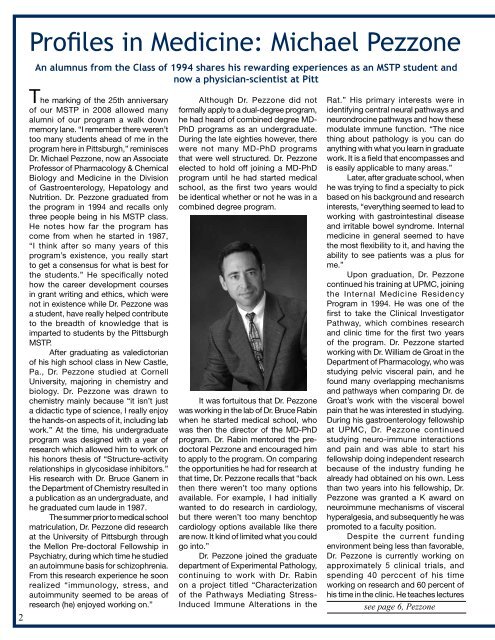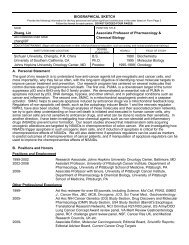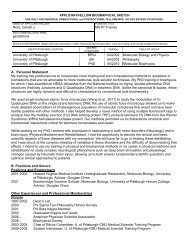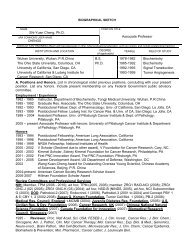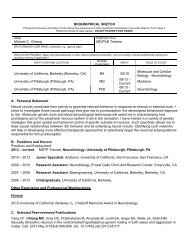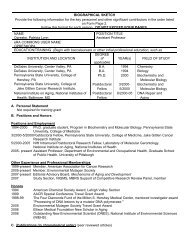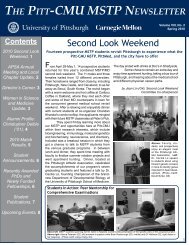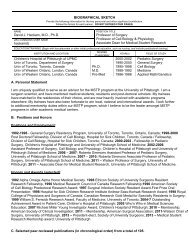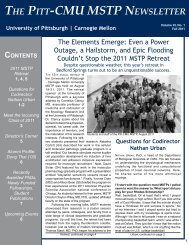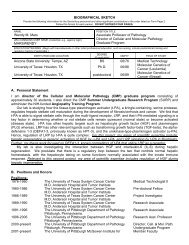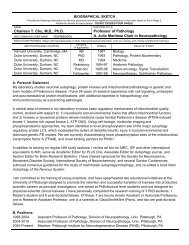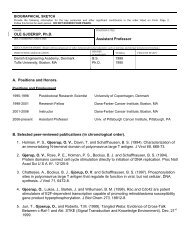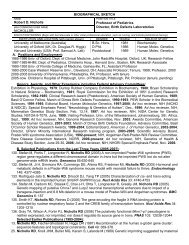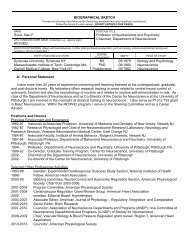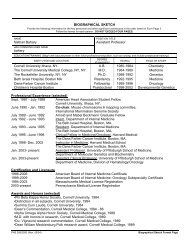Inside... - University of Pittsburgh :: MSTP
Inside... - University of Pittsburgh :: MSTP
Inside... - University of Pittsburgh :: MSTP
You also want an ePaper? Increase the reach of your titles
YUMPU automatically turns print PDFs into web optimized ePapers that Google loves.
Pr<strong>of</strong>iles in Medicine: Michael Pezzone<br />
An alumnus from the Class <strong>of</strong> 1994 shares his rewarding experiences as an <strong>MSTP</strong> student and<br />
now a physician-scientist at Pitt<br />
2<br />
The marking <strong>of</strong> the 25th anniversary<br />
<strong>of</strong> our <strong>MSTP</strong> in 2008 allowed many<br />
alumni <strong>of</strong> our program a walk down<br />
memory lane. “I remember there weren’t<br />
too many students ahead <strong>of</strong> me in the<br />
program here in <strong>Pittsburgh</strong>,” reminisces<br />
Dr. Michael Pezzone, now an Associate<br />
Pr<strong>of</strong>essor <strong>of</strong> Pharmacology & Chemical<br />
Biology and Medicine in the Division<br />
<strong>of</strong> Gastroenterology, Hepatology and<br />
Nutrition. Dr. Pezzone graduated from<br />
the program in 1994 and recalls only<br />
three people being in his <strong>MSTP</strong> class.<br />
He notes how far the program has<br />
come from when he started in 1987,<br />
“I think after so many years <strong>of</strong> this<br />
program’s existence, you really start<br />
to get a consensus for what is best for<br />
the students.” He specifically noted<br />
how the career development courses<br />
in grant writing and ethics, which were<br />
not in existence while Dr. Pezzone was<br />
a student, have really helped contribute<br />
to the breadth <strong>of</strong> knowledge that is<br />
imparted to students by the <strong>Pittsburgh</strong><br />
<strong>MSTP</strong>.<br />
After graduating as valedictorian<br />
<strong>of</strong> his high school class in New Castle,<br />
Pa., Dr. Pezzone studied at Cornell<br />
<strong>University</strong>, majoring in chemistry and<br />
biology. Dr. Pezzone was drawn to<br />
chemistry mainly because “it isn’t just<br />
a didactic type <strong>of</strong> science, I really enjoy<br />
the hands-on aspects <strong>of</strong> it, including lab<br />
work.” At the time, his undergraduate<br />
program was designed with a year <strong>of</strong><br />
research which allowed him to work on<br />
his honors thesis <strong>of</strong> “Structure-activity<br />
relationships in glycosidase inhibitors.”<br />
His research with Dr. Bruce Ganem in<br />
the Department <strong>of</strong> Chemistry resulted in<br />
a publication as an undergraduate, and<br />
he graduated cum laude in 1987.<br />
The summer prior to medical school<br />
matriculation, Dr. Pezzone did research<br />
at the <strong>University</strong> <strong>of</strong> <strong>Pittsburgh</strong> through<br />
the Mellon Pre-doctoral Fellowship in<br />
Psychiatry, during which time he studied<br />
an autoimmune basis for schizophrenia.<br />
From this research experience he soon<br />
realized “immunology, stress, and<br />
autoimmunity seemed to be areas <strong>of</strong><br />
research (he) enjoyed working on.”<br />
Although Dr. Pezzone did not<br />
formally apply to a dual-degree program,<br />
he had heard <strong>of</strong> combined degree MD-<br />
PhD programs as an undergraduate.<br />
During the late eighties however, there<br />
were not many MD-PhD programs<br />
that were well structured. Dr. Pezzone<br />
elected to hold <strong>of</strong>f joining a MD-PhD<br />
program until he had started medical<br />
school, as the first two years would<br />
be identical whether or not he was in a<br />
combined degree program.<br />
It was fortuitous that Dr. Pezzone<br />
was working in the lab <strong>of</strong> Dr. Bruce Rabin<br />
when he started medical school, who<br />
was then the director <strong>of</strong> the MD-PhD<br />
program. Dr. Rabin mentored the predoctoral<br />
Pezzone and encouraged him<br />
to apply to the program. On comparing<br />
the opportunities he had for research at<br />
that time, Dr. Pezzone recalls that “back<br />
then there weren’t too many options<br />
available. For example, I had initially<br />
wanted to do research in cardiology,<br />
but there weren’t too many benchtop<br />
cardiology options available like there<br />
are now. It kind <strong>of</strong> limited what you could<br />
go into.”<br />
Dr. Pezzone joined the graduate<br />
department <strong>of</strong> Experimental Pathology,<br />
continuing to work with Dr. Rabin<br />
on a project titled “Characterization<br />
<strong>of</strong> the Pathways Mediating Stress-<br />
Induced Immune Alterations in the<br />
Rat.” His primary interests were in<br />
identifying central neural pathways and<br />
neurondrocine pathways and how these<br />
modulate immune function. “The nice<br />
thing about pathology is you can do<br />
anything with what you learn in graduate<br />
work. It is a field that encompasses and<br />
is easily applicable to many areas.”<br />
Later, after graduate school, when<br />
he was trying to find a specialty to pick<br />
based on his background and research<br />
interests, “everything seemed to lead to<br />
working with gastrointestinal disease<br />
and irritable bowel syndrome. Internal<br />
medicine in general seemed to have<br />
the most flexibility to it, and having the<br />
ability to see patients was a plus for<br />
me.”<br />
Upon graduation, Dr. Pezzone<br />
continued his training at UPMC, joining<br />
the Internal Medicine Residency<br />
Program in 1994. He was one <strong>of</strong> the<br />
first to take the Clinical Investigator<br />
Pathway, which combines research<br />
and clinic time for the first two years<br />
<strong>of</strong> the program. Dr. Pezzone started<br />
working with Dr. William de Groat in the<br />
Department <strong>of</strong> Pharmacology, who was<br />
studying pelvic visceral pain, and he<br />
found many overlapping mechanisms<br />
and pathways when comparing Dr. de<br />
Groat’s work with the visceral bowel<br />
pain that he was interested in studying.<br />
During his gastroenterology fellowship<br />
at UPMC, Dr. Pezzone continued<br />
studying neuro-immune interactions<br />
and pain and was able to start his<br />
fellowship doing independent research<br />
because <strong>of</strong> the industry funding he<br />
already had obtained on his own. Less<br />
than two years into his fellowship, Dr.<br />
Pezzone was granted a K award on<br />
neuroimmune mechanisms <strong>of</strong> visceral<br />
hyperalgesia, and subsequently he was<br />
promoted to a faculty position.<br />
Despite the current funding<br />
environment being less than favorable,<br />
Dr. Pezzone is currently working on<br />
approximately 5 clinical trials, and<br />
spending 40 perccent <strong>of</strong> his time<br />
working on research and 60 percent <strong>of</strong><br />
his time in the clinic. He teaches lectures<br />
see page 6, Pezzone


